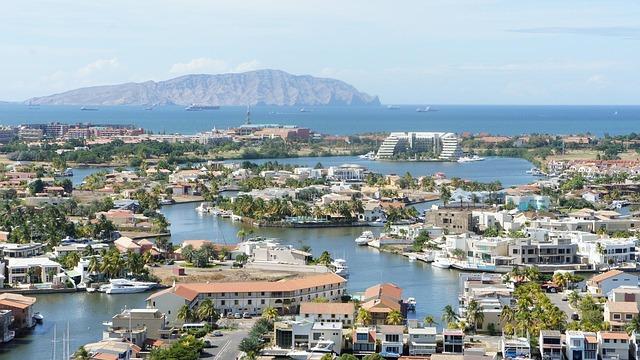In recent years, the geopolitical landscape of South america has undergone profound shifts, influenced in part by evolving tensions between Venezuela and its neighbors. One of the most notable relationships affected by these dynamics is that between China and Guyana. As Caracas intensifies its territorial claims over regions rich in resources, particularly in the Essequibo area, Guyana finds itself navigating a complex interplay of diplomacy, security, and economic interests. Concurrently, China’s increasing investments and strategic partnerships in the region have added another layer of complexity to existing bilateral relations. This article explores how Venezuela’s mounting threats have prompted Guyana to recalibrate its foreign policy, forging closer ties with China as a means of solidifying its sovereignty and securing essential support in the face of external pressures. through an analysis of recent developments,we aim to shed light on the implications of this evolving relationship and its potential to reshape the balance of power in the Caribbean.
Evolving Geopolitical Dynamics in South America
The recent political and economic shifts in south America have brought Venezuela’s increasing threats into sharper focus, creating a ripple effect that extends far beyond its borders. Venezuela’s evolving stance has intensified the geopolitical dynamics between China and Guyana, reshaping their bilateral relations. As venezuela escalates its anti-colonial rhetoric and territorial assertions, Guyana finds itself bolstered by support from China, which has strategically positioned itself as a key ally in this turbulent landscape.
Key Factors Influencing China-Guyana Relations:
economic Investment: China has substantially increased its investments in Guyana, particularly in the oil and natural resources sectors, aiming to secure vital energy resources in response to global demand.
Political Alignment: Guyanese leadership has shown resilience in aligning with Chinese interests as a counterbalance to Venezuelan aggression, reinforcing a partnership that signals both economic and diplomatic support.
Security Collaborations: The growing geopolitical tensions have prompted security discussions between China and Guyana, aimed at ensuring territorial integrity and regional stability against Venezuelan posturing.
These developments are further highlighted by proactive diplomatic engagements. Recent talks between officials from Guyana and China signal a commitment to fortifying their partnership amid the mounting pressures from Venezuela. A comparative analysis of the current situation can be observed through the following table:
Aspect
Guyana
VenezuelaVenezuela’s threats serve as a catalyst for a more pronounced collaboration between China and Guyana, illustrating how regional tensions can redefine international alliances.This evolving geopolitical landscape highlights the intricate interplay of power, resources, and strategic interests that will continue to shape South America’s future.

Venezuelan Aggression: A Catalyst for Change in Guyana-China Ties
The recent escalation in Venezuelan aggression has acted as a catalyst, fundamentally shifting the dynamics of relations between Guyana and China. As Venezuela continues to assert territorial claims over significant portions of Guyanese land, particularly in the oil-rich Essequibo region, the urgency for Guyana to strengthen its international alliances has never been clearer. In light of these developments, China’s strategic interest in enhancing its ties with Guyana presents new opportunities and challenges for both nations.
in response to the growing threats from Venezuela, Guyana has turned to China not only as a partner in economic development but also as a potential ally in regional geopolitics. The realization that sustained support is crucial for asserting sovereignty has prompted guyanese leadership to seek closer bilateral relations with Beijing.collaborative initiatives have begun to emerge, focusing on:
Infrastructure Development: Joint projects aimed at improving transportation and energy sectors.
Investment in Natural Resources: Enhanced Chinese investment in Guyana’s burgeoning oil industry.
Cultural Exchange Programs: Promoting mutual understanding and shared interests through educational initiatives.
Moreover, the strengthening of military ties between China and Guyana illustrates a broader strategic pivot that may have implications for regional stability. The following table highlights key areas of cooperation:
Area of cooperation
Description
Trade Agreements
Facilitating greater exports of goods and services.
Security Partnerships
Joint training and intelligence sharing to bolster defense capabilities.
Crisis Management
Collaboration on emergency response and disaster relief.
This evolving relationship represents a significant departure from traditional diplomatic positions in the region. By aligning with a global power like China, Guyana may not only safeguard its territorial integrity but also position itself as a key player in the global energy market, leveraging its resources amidst rising tensions.

Economic Implications of Strengthened China-Guyana Relations
The recent ramping up of tensions in the region,particularly from Venezuela,has compelled both China and Guyana to strengthen their bilateral ties,leading to significant economic implications for both nations.As these relations evolve, several key factors emerge that highlight their potential impact on the regional economy and global partnerships.
Investment Surge: China’s investments in Guyana have seen a marked increase,particularly in sectors such as infrastructure,energy,and mining. This influx not only stimulates local economies but also ensures China’s access to critical resources like oil and minerals.
Trade Enhancement: Strengthened ties could result in expanded trade agreements, allowing Guyana to tap into China’s vast market. This would diversify Guyana’s economic portfolio and reduce its ancient dependence on a limited number of trading partners.
Geopolitical Strategy: With Venezuela’s assertiveness in the region, both countries may leverage their alliance to form a more united front against external threats, fostering greater economic collaboration alongside their diplomatic objectives.
Workforce Development: China may also aid in training and developing Guyana’s workforce,creating long-term economic benefits. Enhanced skill sets can lead to increased productivity, making Guyana a more attractive destination for foreign investors.
This evolving partnership is not without challenges, as regional disparities and the complexities of international trade agreements come into play. The need for sustainable practices in resource extraction and an emphasis on environmental protection will be paramount as both nations navigate their strengthened relationship.
Area
Potential Impact
Foreign Direct Investment
increased infrastructure projects enhancing economic capacity
Natural Resource Development
Boost in resource extraction with technology transfer
Trade Relations
Diversification away from traditional markets
Geopolitical Standing
Stronger bargaining position in regional negotiations

Strategic Partnerships: Reshaping Security Alliances in the Region
Recent developments in the region have prompted a significant realignment in security alliances, particularly in the context of the escalating threats posed by Venezuela. As this South American nation continues to assert its influence, neighboring countries like Guyana have recognized the need for stronger alliances. A key player in this reshaping of security dynamics is China,which has increasingly positioned itself as a strategic partner for Guyana.
The shift in relations can be attributed to several factors:
Geopolitical Stability: The rise of Venezuelan assertiveness has presented a challenge that necessitates a rethinking of regional security frameworks.
Economic Interests: Guyana’s burgeoning oil sector offers lucrative opportunities,making it an appealing partner for Chinese investment and infrastructure development.
Military cooperation: China’s expanding role in Guyanese military training and technology transfer underscores a growing dependence on Beijing for security solutions.
As the situation evolves, it is indeed crucial to analyse the potential implications for regional dynamics. A table outlining the key factors influencing this partnership can definitely help illustrate the evolving landscape:
Factor
Impact
Venezuelan Aggression
Increases the urgency for mutual defense pacts.
china’s Economic Investments
Fuels Guyana’s growth and potential military upgrades.
Regional Alliances
Encourages new coalitions against common threats.
the interplay of economic interests,military cooperation,and the regional security surroundings is reshaping how countries like Guyana approach alliances,particularly in light of threats from Venezuela. the partnership with China offers both opportunities and challenges as they navigate these tumultuous waters together.

Navigating the Future: Recommendations for Guyana’s Foreign Policy
As tensions escalate in the region, particularly concerning Venezuela’s increasing assertiveness, it is indeed vital for Guyana to recalibrate its foreign policy to ensure stability and security. A multi-faceted approach that embraces strategic partnerships and regional cooperation can significantly enhance Guyana’s standing in the geopolitical arena.
Key recommendations for Guyana’s foreign policy include:
Diversifying Diplomatic Ties: Strengthening relationships with a broader range of countries, including regional allies and global powers, will afford Guyana greater leverage on the international stage.
Enhancing Military Cooperation: Engaging in joint military exercises and intelligence-sharing initiatives with allies can bolster Guyana’s defense capabilities against potential threats.
fostering Economic Partnerships: Prioritizing trade agreements and investment partnerships can definitely help build economic resilience and mitigate vulnerabilities associated with dependence on any single nation.
Participating in Regional dialogue: actively engaging in organizations such as CARICOM and the Association of American States (OAS) will enable Guyana to advocate for collective security measures and construct a regional response to external threats.
The evolving dynamics of China-Guyana relations, particularly in the context of Venezuela’s saber-rattling, underscore the necessity of a proactive foreign policy. As China continues to expand its influence in Latin America through infrastructure investment and economic collaboration, Guyana must navigate these waters carefully, leveraging Chinese engagement while maintaining its sovereignty.
Aspect
Advice
Diplomatic Relations
Strengthen ties with emerging powers
Military Preparedness
Increase joint exercises with allies
Economic Stability
Diversify trade partnerships
Regional Security
Enhance cooperation within CARICOM
Ultimately,Guyana has the opportunity to not only safeguard its national interests but also to emerge as a key player in regional geopolitics.By adopting a forward-thinking foreign policy that responds to contemporary challenges,the nation can navigate these turbulent waters effectively.

The Role of International Stakeholders in Mediating Tensions
The escalating tensions stemming from Venezuela’s assertive claims over disputed territories have drawn significant attention from various international stakeholders. As the geopolitical landscape shifts,countries with vested interests in the region,particularly China and the United States,find themselves navigating a complex web of alliances and rivalries. In this context, stakeholders play a critical role in mediating the disputes and fostering dialogue among the affected parties.
Key players that influence the situation include:
China: As a significant investor and partner in Guyana, China’s economic interests compel it to advocate for stability and development in the region. Though, its support for Guyana could also be seen as a challenge to Venezuela, prompting a delicate balancing act.
United States: Traditionally a regional power,the U.S. has begun to engage more actively with both Guyana and venezuela. Its diplomatic maneuvers often aim to curtail Russian and Chinese influence, creating opportunities for intervention and mediation.
CARICOM: the Caribbean Community has a vested interest in maintaining regional stability. CARICOM’s collective efforts could prove essential in facilitating dialogue and conflict resolution, emphasizing peaceful negotiation over military escalation.
UN Observers: The involvement of United Nations observers can lend legitimacy to peacekeeping efforts and provide a neutral ground for discussions aimed at resolving territorial claims.
These stakeholders not only influence governmental policies but also shape public perception and transitional dialogues between the nations involved. As tensions rise, their collective voice could lead to a more comprehensive approach, emphasizing the importance of peaceful negotiations and regional cooperation.
To illustrate the current dynamics, consider the following table summarizing the stances of key international actors on the venezuela-Guyana tensions:
Actor
Position
Action Plan
China
Support for Guyana’s sovereignty
Increase investments and diplomatic engagements
United States
focus on regional stability
enhance diplomatic relations with Guyana
CARICOM
Promote dialogue between Venezuela and Guyana
Facilitate peace talks and resolutions
UN
Neutral observer
Deploy peacekeeping forces if necessary

To Conclude
As Venezuela’s geopolitical maneuvers continue to cast a shadow over the region, the evolving dynamics between China and Guyana are becoming increasingly complex. This relationship, underscored by economic ambition and strategic alliances, illustrates the broader implications of regional tensions for global geopolitics. With China positioning itself as a key player in South America, the implications of its partnership with Guyana are likely to extend beyond mere economics, potentially reshaping diplomatic ties and security frameworks in the face of external threats.As both nations navigate these turbulent waters, the outcomes of their collaboration could redefine power balances not only in the caribbean but also in the broader context of international relations. Observers and stakeholders alike will be keenly watching how this relationship evolves in response to Venezuela’s ongoing challenges, as the ramifications could resound far beyond the borders of these three nations.
—-
Author : Mia Garcia
Publish date : 2025-03-18 02:01:34
Copyright for syndicated content belongs to the linked Source.